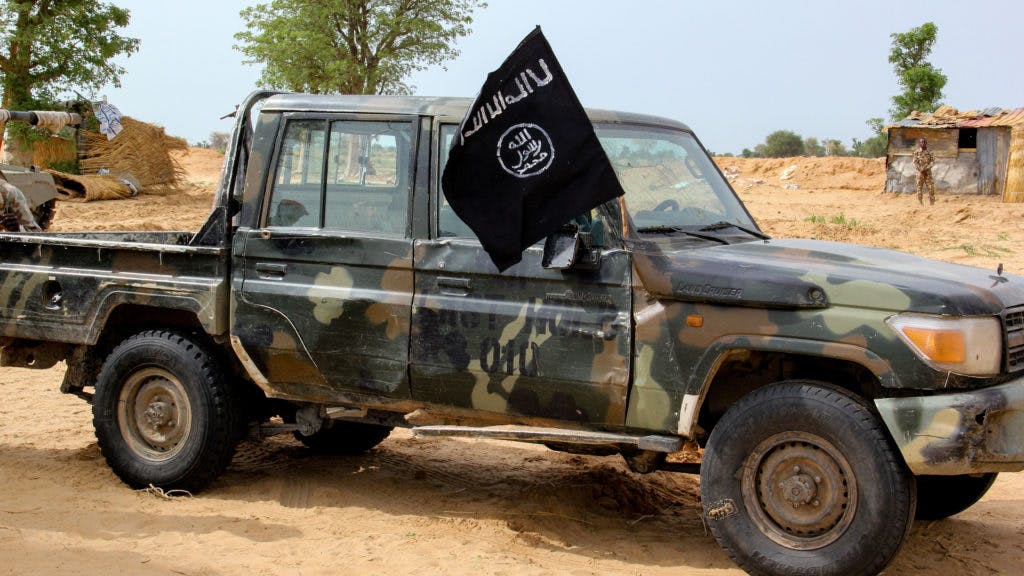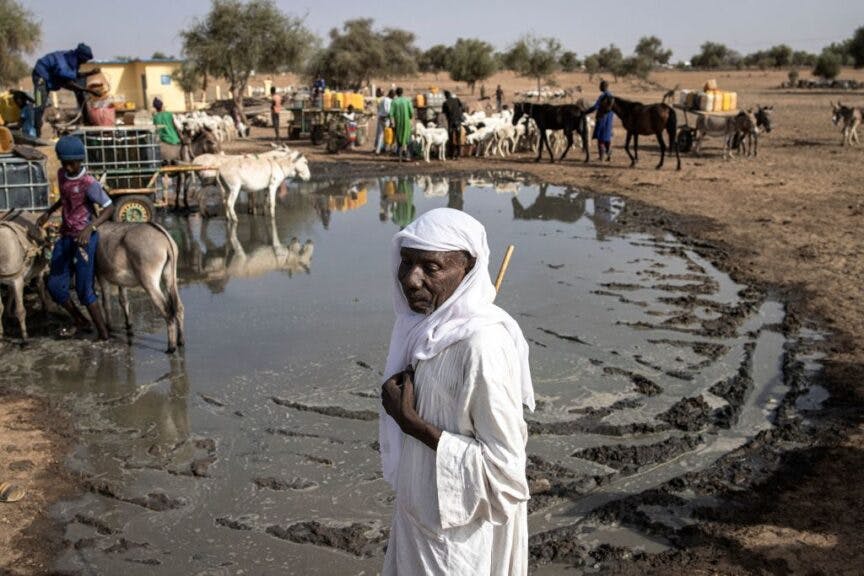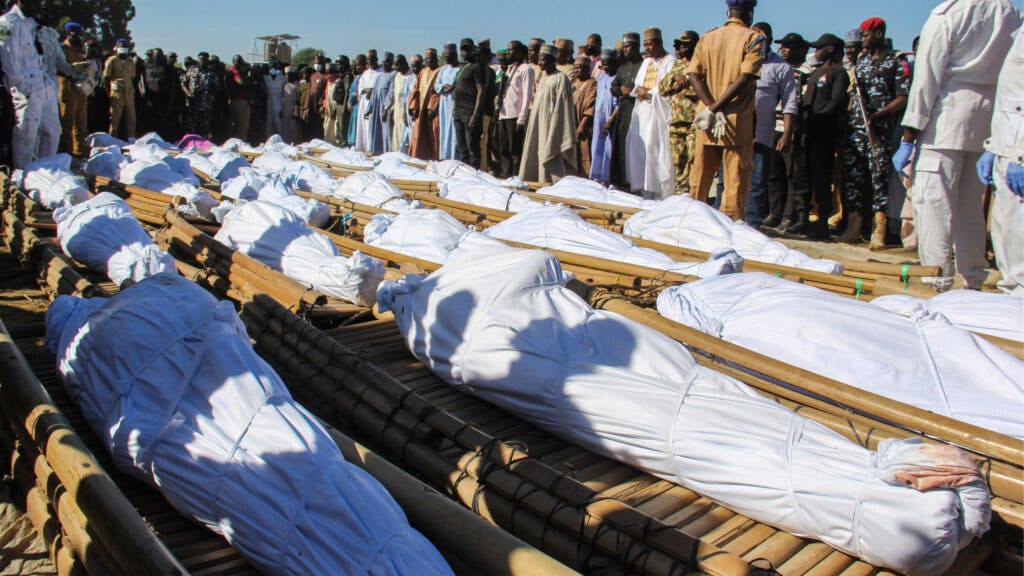


Over the past 10 years, Northern Nigeria has quickly risen to the top of the list as the most dangerous place to be a Christian. More Christians are killed here than anywhere else in the world.
The data show us that it’s not by slim margins. According to International Christian Concern, in 2022, 90% of all Christians killed in the world were killed in Nigeria. Last year, that number was around 70%.
The persecution of Christians in Northern Nigeria has quickly evolved into a full-on genocide. But how did this happen? How did the region become a stronghold for this violence against those who follow Christ?
Most of the region is a virtual “wild west” of Africa, leaving Northern Nigeria largely unchecked with a sparse military presence. The geography, coupled with a rise in Islamic extremism, has allowed groups like Boko Haram and ISIS-WA (ISWAP) to flourish unimpeded.

A vehicle allegedly belonging to the Islamic State group in West Africa (ISWAP) is seen in Baga on August 2, 2019. AUDU MARTE/AFP via Getty Images
According to the most recent statistics, Boko Haram alone is responsible for the deaths of 38,000 people between 2011 and 2023. Their growth has been so staggering that it has essentially overwhelmed the Nigerian government’s attempts to stop it. In 2023, I witnessed Nigerian soldiers walk off the job when ordered to fight Boko Haram militants. They told me that fighting Boko Haram was a suicide mission. These terrorist groups keep the people of northern Nigeria in a constant state of fear. They yield this fear skillfully to maintain control. While I truly believe Nigerian President Bola Tinubu wants to see change in the region, his government is outnumbered and outgunned.
Another equally devastating contributor to the problem is the ethnic conflict between Fulani Muslims (herders) and Christians (farmers). While this is not “terrorism” in the traditional sense of Islamic Jihad, the results are no less deadly. There are approximately 17 million Fulani Muslims in Nigeria. Most Fulani are nomadic and predominantly raise cattle to maintain their livelihood. In this region, Christians have largely settled and sustain themselves by planting crops. As the Fulani migrate their cattle over vast distances, those cattle often wander into the farm fields of Christians, destroying their crops. While some Fulani Muslims have been radicalized, the herder vs. farmer crisis is overwhelmingly the result of tensions over land.

JOHN WESSELS/AFP via Getty Images
For years, I have brokered peace agreements between hundreds of Fulani Muslim and Christian communities. In nearly every case I have worked, the root cause of the conflict boils down to violence that arose from cattle destroying crops. And that violence is not one-sided. Christians have retaliated for the destruction of their crops; however, more often than not, these conflicts result in an inordinate number of Christian deaths.
The most recent example is the massacre of nearly 200 Christians that happened on June 14, 2025. As a result of Nigeria’s diminishing areas for cattle grazing, the Fulani Muslims attacked Christians as a means to claim land for their cattle to graze. Further evidence is that every dry season, when access to good feeding grounds is at its lowest, there is a surge of violence between the Fulani herders and Christian farmers.
Northern Nigeria, like much of Africa, is gripped by severe socio-economic challenges that fuel instability and hardship. Most people in Northern Nigeria live on the equivalent of a little more than $1 USD per day. Currently, a 10kg (22-pound) bag of rice costs about $35 USD. People barely earn enough to feed themselves. The annual inflation rate is around 24%, which drives the cost of food higher and higher. UNICEF has placed Nigeria on its crisis list, stating that over 25 million people are at high risk of food insecurity. These conditions have created an environment that keeps people in a perpetual state of survival.
But how do dire socio-economic conditions contribute to Christian persecution?

TOPSHOT – Mourners attend the funeral of 43 farm workers in Zabarmari, about 20km from Maiduguri, Nigeria, on November 29, 2020 after they were killed by Boko Haram fighters. AUDU MARTE/AFP via Getty Images.
Inflation and food shortages exacerbate the conflict between Fulani Muslim herders and Christian farmers because, to them, every day is a desperate fight for survival. Tensions over grazing land — the source of sustenance for both the herders and farmers — run at a fever pitch. These socio-economic conditions are also the reason why so many young men are drawn to radical Islamic groups like Boko Haram and ISWAP. Not only do these groups provide a support system, but they also pay well for people willing to follow their orders and commit violent acts. I’ve heard reports of Boko Haram paying their fighters $100 USD for the successful execution of a single act of terrorism. That’s a small fortune in this part of the world.
The desperate conditions of Northern Nigeria are the fuel that keeps the fire of persecution burning.
These are complex problems in a complex part of the world. That’s why, at Across Nigeria, we are driven by a powerful mission: not only to uplift suffering Christians but also to extend Christ’s love to Muslims. Through our network of primary schools across Northern Nigeria, we empower Fulani Muslims with transformative education and literacy, building bridges of hope and understanding. In every area where we operate a Fulani school, the violence has dropped by 60 to 70%. We have found that providing people with options and opportunities is the best way to deter them from resorting to violence.
By helping Muslims overcome these challenges, we are helping to significantly reduce the violence and bring an end to the suffering. We have done a lot, but we have a long way to go. With the proper support, I believe we can reduce the violence and bring an end to suffering for the Muslims and Christians in the most dangerous region in the world.
* * *
Brad Brandon is the founder and CEO of Across Nigeria. Since 2018, he has been actively serving in predominantly high-risk, highly persecuted areas like Northern Nigeria and other parts of West Africa.
The views expressed in this piece are those of the author and do not necessarily represent those of The Daily Wire.

Continue reading this exclusive article and join the conversation, plus watch free videos on DW+
Already a member?
